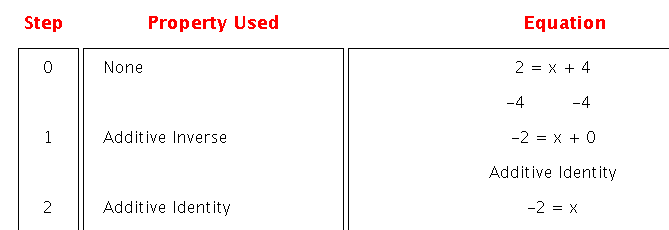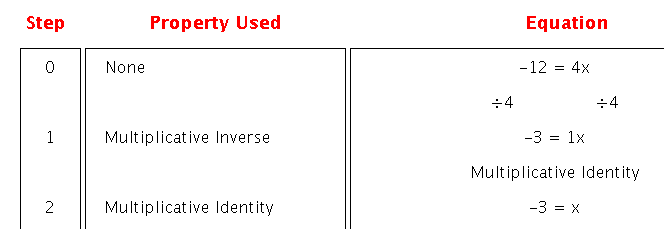Identity Properties
|
Mentor: Let's start out with an easy question: What is 4 - 4? Student 1: It's zero, right? Why are you asking us such a simple problem when we have been trying to "solve for x" for the last few days? Mentor: Zero is correct and my question does actually relate to what we have been doing. Look at this problem: 
Mentor: Where do you see 4 - 4 is this problem? Student 2: Well, to solve for x you need to subtract four from each side. That would be 4 - 4. Mentor: Why are we subtracting four? Student 2: To get rid of the four on the right side of the equation and isolate x, like we have been doing. Mentor: Okay, we are going to subtract four from each side to keep it balanced, but what did you tell me earlier was the answer to 4 - 4? Student 1: Zero. Mentor: Okay. On the left side we have 2 - 4, which is what? Student 2: Negative two. So you have -2 = x. Mentor: That is what we have been doing thus far, but you just told me several times that 4 - 4 is zero, so I am going to write that down. So I have:
-2 = x + 0

Student: I am pretty sure that the answer is -2. Can we just get rid of that zero? Mentor: Well yes, but in so doing we actually use a specific property. Tell me, what is special about zero when you add it to other numbers? Student 1: Well, it represents nothing. Mentor: That is true. How does that relate to addition? Student 2: You can add zero to any number and nothing changes. Mentor:You are exactly right. Zero is a special number in addition because it can be added to anything and it doesn't change the value. It is called the additive identity. If we use the property that anything plus zero equals the first value, we have:
x = -2

Mentor: There is also a multiplicative identity. Will someone try to define a multiplicative identity? Student 1: Maybe it is something that you can multiply numbers by and get the same numbers. Mentor: That is a pretty good definition. The multiplicative identity is a number that can be multiplied by a given value and the result is that given value. Does anyone know a number with that property? Student 1: It can't be zero because 6 * 0 = 0, not 6. Student 2: I think it is one, because 6 * 1 = 6. Mentor: Does everyone agree that one is the multiplicative identity? Can anyone think of a number that when you multiply it by 1 does NOT give you back that value? Student 1: No. I don't think there is such a number. Mentor: You are correct, 1 is the multiplicative identity. An "identity" in mathematics is something that gives you the same value back you started with. Let's look at a problem involving the multiplicative identity. 
Mentor: How would we solve this problem? Mentor: We should divide by 4 so that the x is alone. Mentor: Very good. What is the answer to 4 divided by 4? Student 2: It's 1 over 1, which is just one. Mentor: Very good. So now we have -12 divided by 4, which is -3 on the left side. And on the right side, 1 times x. 
Student 1: So the answer is -3, but we have to do something with the 1. Mentor: Exactly. If we use the property that one times anything is that given value, we now have -3 = x. 
Mentor: Now you know how to use the additive and multiplicative identities when solving for x. |
